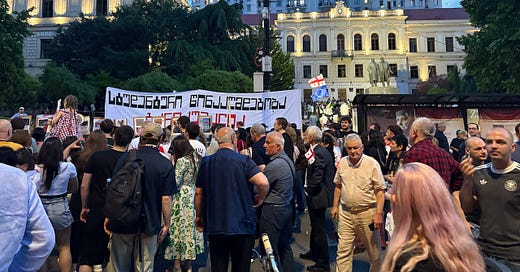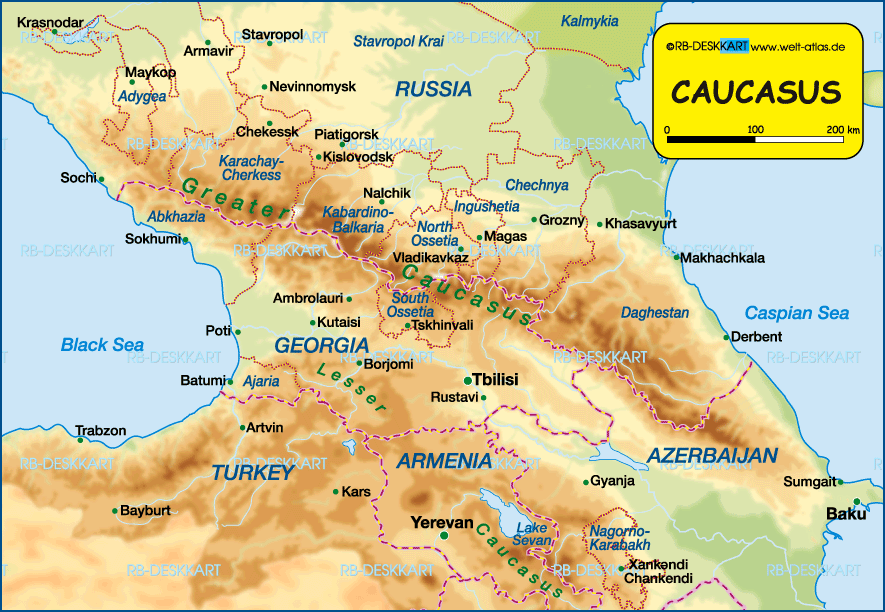Falling Apart at the Seams
As the new world order takes shape, regions that get the least attention are where trouble is often most likely to start.
TBILISI, Georgia—One of the best jokes I heard on a two-week trip through the Caucasus asked why it would be a tragedy for Armenia to send an astronaut to space.
“All Armenians would die of shock,” the answer goes. “All Georgians would die of envy and the entire region would be left under the control of Azerbaijan.”
When told by an Armenian, the punchline has a self-deprecating charm. Still, it also highlights the historical rivalries that persist in a region that has been carved up and traded among the world’s great powers for centuries. Today, Russia, Iran and Turkey continue to angle for advantage just as the Tsar, the Shah and the Sultan did in their day. Washington and Beijing are keeping an eye on the region, too.
Here in Georgia’s capital, street demonstrations proceeded peacefully during last Monday’s Independence Day celebrations, even if two opposition leaders were arrested later in the week. The protesters insist that last fall’s elections that brought the Georgia Dream Party to power were rigged under Russian influence to keep the country in Moscow’s orbit. And they insist on the release of political prisoners, including former president Mikheil Saakashvili.
The European Union, which granted Georgia candidate status in December 2023, put the application on hold last year amid concerns about democratic backsliding. Last November, the new government officially suspended the application, citing “blackmail and manipulation” from Brussels, sparking violent demonstrations.
Secretary of State Marco Rubio entered the fray two weeks ago when he revealed the Trump Administration was considering sanctions against Georgia’s government, which he called “anti-American.” While opposition parties are mainly focused on excessive Russian involvement, Republicans have sounded an alarm on rising Chinese influence.
As someone who tracks the ebbs and flows of geopolitical power and global capital for a living, what jumps out from these headlines is just how much the new world order that is taking shape continues to drive events in less-examined regions like this rich and complicated corridor between the Black Sea and the Caspian Seas.
The opposite is also true: developments here will themselves help determine whatever post-post-Cold War balance of power may emerge. I’m not predicting any new wars, but diplomats and investors need to keep a close watch on regions like this, where most outcomes are the unintended consequences of broader forces at work. While regions between great powers are often dismissed as periphery, these are precisely the areas where shifting power is most visible and where trouble is most likely to start.
Russia’s invasion of 2022 Ukraine, for example, offered a golden opportunity for Azerbaijan to take full control of Nagorno-Karabakh, an Armenian enclave within its borders. The region has changed hands repeatedly for at least a century, and Azerbaijan reclaimed a large portion of the region in 2020. But with Moscow distracted by its failures in the Donbass in 2023, Russian peacekeepers did nothing to stop Azerbaijan from seizing the rest of the region and driving out hundreds of remaining Armenian civilians.
It didn’t hurt that Azerbaijan had been modernizing its military for years on profits from the Baku-Tbilisi-Ceyhan pipeline it built following the collapse of the Soviet Union to deliver oil westward without crossing Russia – another unintended consequence of geopolitical power shifts in recent decades.
Armenians, for whom the genocide at the hands of the Ottoman Empire before World War I remains a fresh memory, accused the Azerbaijanis of atrocities and ethnic cleansing. And a drive through northeastern Armenia shows a fortified border where fresh military defenses are under active construction.
But shifting global alignments threaten to complicate developments here quickly.
For Georgia, Azerbaijan remains a key source of energy, and Turkey is its largest trading partner. Russia is viewed as the real threat. Even if Russian trade volumes rank second, feelings remain raw since the 2008 war, which essentially transferred control of the northwestern region of Abkhazia from Tbilisi to Moscow.
But shifting global alignments threaten to complicate developments here quickly. Georgia’s unsettled political dynamics offer a Rorschach test for outside agendas. China has not delivered much in the way of investment, but it seems to be the focus of the Trump administration’s concerns as it clings to a possible deal with Moscow on Ukraine. Russia, meanwhile, is intent on limiting Western influence in what it considers a vital southern region. While NATO membership for Georgia has long been off the table, the European Union still sees everything through the lens of democratic institutions and expanding Russian ambition.
This could all bubble along without significant consequence beyond these three beautiful countries and their 17 million warm and hospitable people. But any reading of history suggests that this part of the world never remains isolated from the global drama for long.






These kinds of behind the scenes glimpses at the seams of the fraying international order are valuable. Keep them coming. Hope we’re not in the latest loop of recurring history, one or two cycles on from, say, 1912-13.